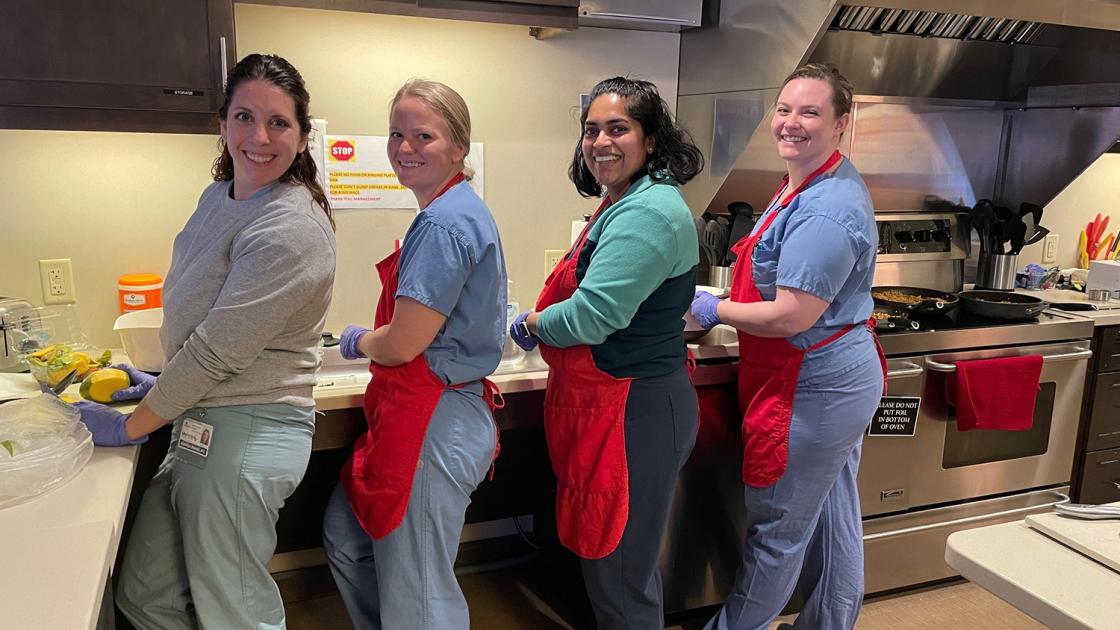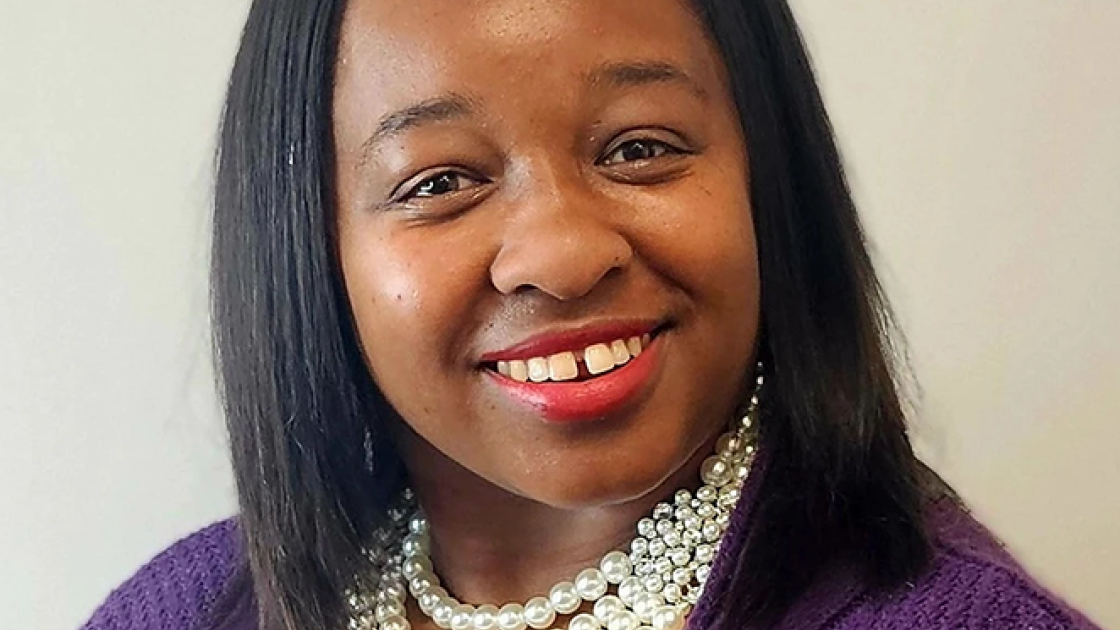
New emphasis on student and resident mental health and wellness
No one ever said medical school was easy.
The prevalence of mental health struggles in medical school is well-known, and studies show that medical students experience disproportionately higher rates of depression and burnout.
Stress can accumulate and undermine confidence in abilities and, if left unchecked, grow into something detrimental.
Results from an Elsevier Health survey released in November 2023 showed a quarter of medical students considered quitting school, and 60 percent were worried about their mental health.
Students face growing challenges each year as they advance through the curriculum, learn new systems, train in increasingly complex simulations and work beside physicians to master life-saving techniques. Here at SIU School of Medicine, we are shifting the narrative to provide students with not just academic resources but providing them with the same wellness and mental health resources we encourage them to give their patients.
A generational shift
For many years, the lack of knowledge about mental health in the general population led to fear of mental health conditions, causing stigma and mistreatment of those in need of care. Today, there is far more understanding of many mental health conditions and how they can affect people in different ways, which has led to greater awareness, better care and support. Within the medical community, mental health is more widely discussed and acknowledged as critical to both physicians and patients alike.
A renewed focus on mental health occurred in the wake of the global pandemic. Institutional leadership at SIU Medicine moved employee and student wellness from a goal to a mission. Fortunately, crucial groundwork had already been done by creating the Center for Human and Organizational Potential (cHOP), which began offering programs and care in the fall of 2019.
Administrators and instructors want students to feel comfortable in the classrooms, corridors and clinics, able to focus on the tasks at hand as well as know they can draw from multiple resources when feelings of stress and anxiety start to disrupt their learning.
Both Associate Dean of Student Affairs Dr. Haneme Idrizi (’03) and Associate Dean of Graduate Medical Education Dr. Careyana Brenham (’00) are graduates of SIU School of Medicine. They can sympathize – and contextualize – how different times call for different measures.
“The School of Medicine has always been supportive of students with mental health issues,” said Idrizi. “That said, open conversations and outreach efforts around this topic were not the norm during my medical school and residency training. This simply didn’t exist 20 years ago. The prevailing mindset was to ‘push through.’”
Today there is a greater focus on the mental health challenges facing medical trainees, but more needs to be done. Placing blame on students for a perceived lack of resilience or self-care is misleading and dangerous, Dr. Idrizi believes. “While medical school academics are necessarily challenging, it’s best to acknowledge and address real issues that negatively affect student mental health and serve as barriers to them seeking help.”
“This generation of trainees wants more, and they’re demanding a medical profession that places a higher value on the health and well-being of its workforce. Medical education must do better to respond to these needs,” Idrizi said.
Since assuming her new role as associate dean in 2022, Dr. Idrizi has directed SIU’s education leadership teams to emphasize mental health support across multiple platforms. Whether in the form of curriculum and assessment changes, efforts addressing student food insecurity or offering easily accessible mental health services, the School of Medicine is attempting to address stressors that impact trainees' overall well-being. Some examples:
 In Carbondale, students have access to low-cost counseling and psychological services at the SIU Student Health Center.
In Carbondale, students have access to low-cost counseling and psychological services at the SIU Student Health Center. - In Springfield, the SIU Behavioral Health Program at SIU Center for Family and Community Medicine offers free, confidential mental health services to students by providers with no role in their training, assessment or promotion. A behavioral therapist also offers weekly walk-in hours.
- A Student Wellness Room opened in 2022, across from the student tutor rooms at 801 North Rutledge. It contains comfortable furniture, a motorized massage chair, soothing lighting, artwork and art supplies. Grants from cHOP supported some of the acquisitions.
- The medical school has partnered with TimelyCare®, a virtual health and well-being platform focused on providing accessible 24/7 mental health services at no cost to the students.
- Finally, new Wellness Chairs have been elected from each class to advocate on behalf of classmates and coordinate activities and events that promote student wellness.
Welcoming wellness chairs, behavioral health counselor
The school’s newly appointed Wellness Chairs have taken on assorted duties to assist their classmates with mental health initiatives. Fourth-year medical student Nick Porter helps with peer-to-peer counseling, designed to provide a supportive environment for the student to discuss concerns. Andrew Buchheit, a third-year medical student, has spearheaded the creation of a popular food pantry in the student resource room that is periodically replenished from employee and faculty donations. Molly Smith, also an MS3, added a professional clothing closet to the room, and students can take whatever garments they need for interviews and doctoring. Jessica Rajkumar, second-year medical student, helps manage the resource room and shares information with her peers, connecting them to appropriate programs. (Porter, Rajkumar and Buchheit are pictured, left to right, in the Student Wellness Room.)
The chairs collaborated with Student Affairs to organize activities for the Student Wellness Week in January. Learners could attend cooking classes, stock up on movie snacks and enjoy complimentary passes to Malibu Jack’s, an indoor theme park at White Oaks Mall. Mother Nature also contributed, generating a “free day” when an ice storm closed the Springfield campus.
Collectively, the wellness officers’ work has been well-received. In a 2023 student survey, a pair of medical students singled out the new pantry for its convenience:
"Every time I find something in the Student Resource Room that I need, it feels like a weight off my shoulders to not have to worry about it - snacks, toilet paper, paper towels, etc."
"While I have been lucky enough to be able to afford some type of food, especially during the past year as rent, utilities and other costs increased, I’ve had to decrease the amount I spend on groceries. Some days, just knowing I can grab a quick bite to eat from the student lounge has been such a relief. It’s one program that shows the school cares for the longitudinal well-being of students."
A new position of behavioral health coordinator was created within Family Medicine in 2023. Stephanie Forgas works with the SIU medical students from an office based in the Springfield Family Medicine clinic at 520 N. Fourth St., with walk-in hours at an office at 801 N. Rutledge from 1 to 4 p.m. on Thursdays.
In addition to counseling students, Forgas oversees a new peer support group established within the Psychiatry Interest Group. The Virden native also offers annual training for students interested in leading peer support and teaches some of the wellness curriculum.
 During the past year, Forgas estimates she and colleagues have counseled about 70 students. She said the range of issues is many, but all too common to medical school: stress, burnout, imposter syndrome, the sense of being overwhelmed, anxiety for residency matching and finding personal restorative time amid a full schedule.
During the past year, Forgas estimates she and colleagues have counseled about 70 students. She said the range of issues is many, but all too common to medical school: stress, burnout, imposter syndrome, the sense of being overwhelmed, anxiety for residency matching and finding personal restorative time amid a full schedule.
Her husband, David, is a 2020 graduate of the medical school, so she has seen the mental health challenges from dual perspectives: as a spouse and as a care provider. She is encouraged by what she’s seen. “SIU has really ramped up its behavioral health services since 2020,” Forgas said. “The number of students participating in therapy has quadrupled.” She attributes this to the school’s promotional efforts, greater post-pandemic demand and a reduction in the stigma associated with self-care.
“I make it a point to tell the students, at the end of the day you're still human. Just because you are working toward this amazing degree does not lessen your emotions when you go through stressful times or struggle with balancing life and ambition.”
Residents are vulnerable too
Dr. Careyana Brenham, associate dean of Graduate Medical Education, can recall the way mental health issues were managed during her time as an SIU medical student (’00), resident (’03) and faculty member. As a second-year student, Brenham utilized Family Medicine as the provider for student medical care. Its clinicians assisted her with women’s care and pregnancy while in school, but mental health counseling services were not discussed openly.
Once students graduate and move on to residency, their respective hospital employers provide their health care coverage. When Brenham began her family medicine residency, again no one mentioned mental health needs, but the assumption was that it was available through her primary care provider and covered by insurance.
“The residency program had a counselor who worked with our patients and taught us about mental health from an educational standpoint. We had Balint groups and discussions that were patient-focused,” Brenham said. “I'm sure we could have talked to him for our own mental health care needs, but it just wasn't something that was discussed amongst colleagues.”
The issue became tragically relevant in the third month of her residency. On a weekend pediatric rotation with 24-hour shifts, Brenham was the family medicine resident on call for Saturday, and a pediatric teammate had Sunday. Sunday came and the pediatric resident didn't come in. “They tried calling her repeatedly. When they couldn’t contact her and she didn't show, I stayed late. And then on Monday I came in to work, and I learned that she had committed suicide,” she said.
Brenham replayed past conversations in her head. “I remembered her talking to me, asking how I felt. Like, ‘residency training can be tough’ and so forth. And she said if I needed anything to let her know.” Despite it being traumatic for all those involved, Brenham didn't notice any changes to the residency counseling services.
Brenham completed her residency in 2003 and began her faculty career at SIU soon after. Within her new role as student health director, she led efforts to get students to recognize their personal mental health needs, working with internal medicine counselor Bunny Sperling. Together, they treated a lot of ADHD, depression and anxiety, Brenham said.
She expanded the care for residents, too, with discussions on mental health and behavioral health. Resident support groups were rolled out, with debriefings after difficult situations and counseling options emphasized.
Now, two decades later, Dr. Brenham is the associate dean for Graduate Medical Education (GME) and happy to see all the progress in residency mental health care.
“I think we have a good foundation in place. We really stress mental health. With insurance, a resident can see their own primary care provider or their own counseling services. There's employee assistance counseling available at both hospitals, and we have resources to see psychiatry with confidentiality.”
As in Student Affairs, wellness is now an organizational mission for GME. It’s driven by wellness committees, and residency programs are encouraged to have a robust wellness curriculum and build in wellness days and activities.
 Brenham is also excited about the recent addition of Parental Caregiver Medical Leave (PCML). All SIU residents can now receive up to six weeks of paid PCML to attend to personal and family needs. Prior to this, absences to care for yourself, a loved one or to be home with a pregnancy required cobbling together vacation and sick days.
Brenham is also excited about the recent addition of Parental Caregiver Medical Leave (PCML). All SIU residents can now receive up to six weeks of paid PCML to attend to personal and family needs. Prior to this, absences to care for yourself, a loved one or to be home with a pregnancy required cobbling together vacation and sick days.
“It shows our residents that the SIU community cares about them,” Brenham said. “If they have mental health concerns, we have many resources available. They just have to take advantage of them.”



